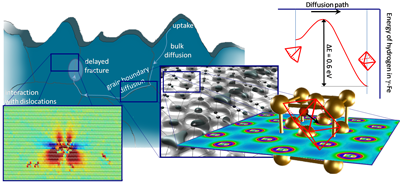Just another WordPress site - Ruhr-Universität Bochum
Ab Initio Based Modelling
- Prof. Dr. Jörg Neugebauer
- Dr. Tilmann Hickel
Research

The Advanced Study Group (ASG) Ab Initio Based Modelling is the organizational unit combining the theoretical materials simulation activities in the institutes collaborating with ICAMS, thus serving as a centre of competence for different concepts in materials modelling. At the same time, the ASG contributes individual projects to the research of ICAMS, which aim at a better understanding of steel properties at the atomistic scale by means of ab initio methods. The heart of the ASG is situated at the Max-Planck-Institut für Nachhaltige Materialien GmbH in the department of Computational Materials Design (CM) of Prof. J. Neugebauer, where highly accurate simulation tools are developed and applied, which are feasible on present day computers to predict materials properties and processing. Within the department the inherent multiscale character of realistic materials is considered in a bottom-up approach, motivated by the fact that the electronic scale is the fundamental scale which eventually controls processes on the macroscale. This approach has the advantage that it can be based on the well-established laws of quantum mechanics. It is ,therefore, free of any adjustable or empirical parameters (ab initio); the elementary building blocks such as electrons and nuclei used in the simulations are identical to those in nature, and all equations defining the dynamics of these building blocks are well known.
